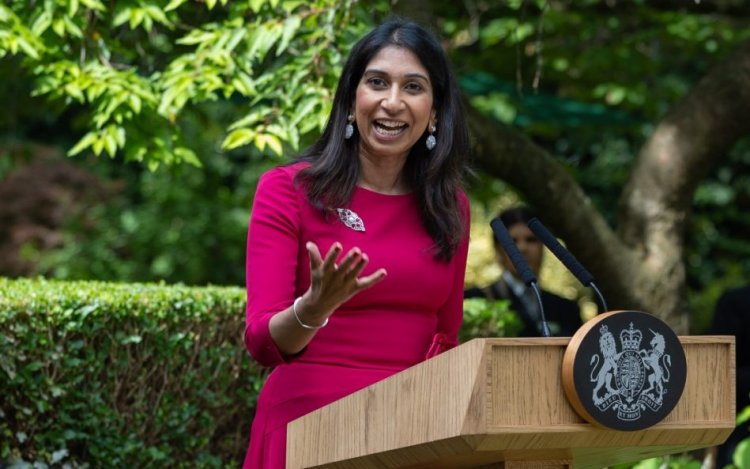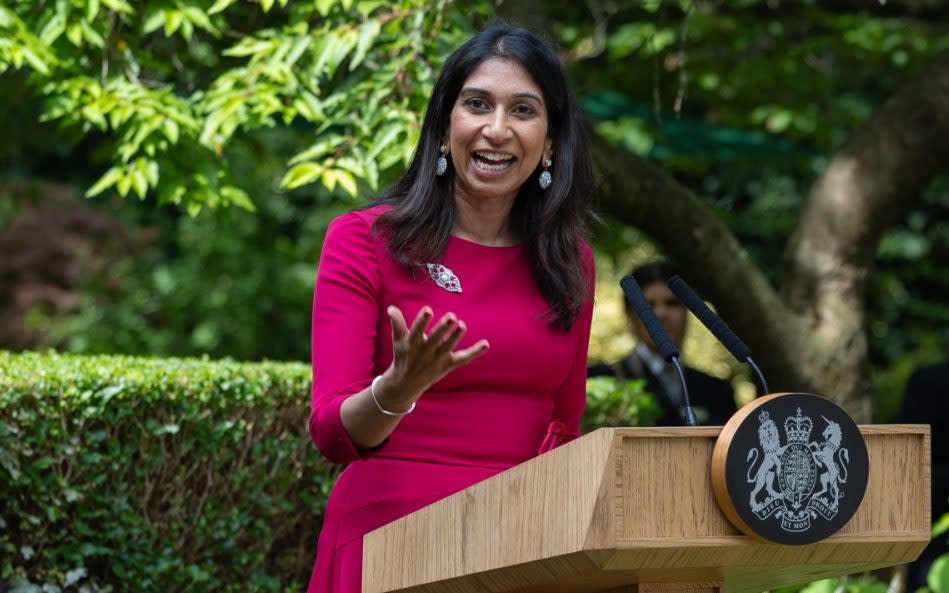Suella Braverman: Police must investigate every theft
Suella Braverman pictured at the Police Bravery Awards Reception in JulyPolice must investigate every theft, the Home Secretary has said as she warns that ignoring shoplifting and stolen cars, bikes or phones is “completely unacceptable”.Writing exclusively in The Telegraph, Suella Braverman outlines new guidelines for all forces which compel officers to pursue every offence where there is a “reasonable line of enquiry”.Saying no crime is too trivial to investigate, she urges forces to improve their performance dramatically in dealing with theft, shoplifting and criminal damage.The success rates for solving burglaries and theft have fallen so low in large parts of the country that the offences have effectively been decriminalised, investigations by The Telegraph have shown.Mrs Braverman has now secured an agreement from all 43 police forces in England and Wales to follow up on any evidence where there is a reasonable chance of catching the criminal, whether from CCTV footage, doorbell


Police must investigate every theft, the Home Secretary has said as she warns that ignoring shoplifting and stolen cars, bikes or phones is “completely unacceptable”.
Writing exclusively in The Telegraph, Suella Braverman outlines new guidelines for all forces which compel officers to pursue every offence where there is a “reasonable line of enquiry”.
Saying no crime is too trivial to investigate, she urges forces to improve their performance dramatically in dealing with theft, shoplifting and criminal damage.
The success rates for solving burglaries and theft have fallen so low in large parts of the country that the offences have effectively been decriminalised, investigations by The Telegraph have shown.
Mrs Braverman has now secured an agreement from all 43 police forces in England and Wales to follow up on any evidence where there is a reasonable chance of catching the criminal, whether from CCTV footage, doorbell videos, GPS trackers or witness accounts.
The guidance is to be issued to forces by the College of Policing, setting out the evidence and “reasonable” leads detectives and officers will be expected to follow. The police watchdog will assess performance against the rules with the ultimate sanction of placing forces in “special measures” if they fail.
It follows criticism from Andy Cooke, the Chief Inspector of Constabulary, that officers have abandoned many inquiries into common crimes with “no suspect identified” despite there being outstanding lines of enquiry.
In the year to March, forces charged a suspect in only 2 per cent of vehicle and bike thefts, 4 per cent of residential burglary, 4 per cent of criminal damage cases and 6.5 per cent of muggings.
Mrs Braverman writes: “Victims of these awful crimes are failed when police simply don’t take an interest in following reasonable leads – instead just handing out a crime reference number. It’s completely unacceptable.
“Let’s be clear: all crime matters. There is no such thing as a trivial crime. And the police must not indicate to criminals that they are effectively free to break certain laws.”
Mrs Braverman writes that she expects police and crime commissioners to hold forces to account on the agreement between police chiefs and the Home Office.
In June, The Telegraph revealed that not a single vehicle, bike or personal theft had been solved by police in between half and two-thirds of the 30,100 neighbourhoods in England and Wales in the past three years. For burglaries, none had been solved in half the neighbourhoods over the same period.
Corruption scandals
The demand for improved police performance to restore public trust follows a series of sex and corruption scandals. Ministers are demanding police focus on the “basics” of solving crime after an uplift of 20,000 extra officers and a new deal with the NHS to slash police call-outs to mental health incidents.
Under the guidance, police must investigate all crimes where there is clear recorded CCTV, doorbell or dashcam footage, eyewitness accounts, “strong forensic” evidence such as fingerprints or DNA from blood or hair, or where there is stolen property with “unique” features such as a bike or phone with serial numbers.
Standards are also to be introduced to require officers to attend burglaries “as early as possible” to boost the chances of solving them by garnering evidence and witnesses early.
Mrs Braverman is also giving police powers to test arrested suspects for cannabis and the party drug ketamine so they can be treated for their habit and steered away from crime. and she urged police to make “full use” of stop and search to tackle “flagrant antisocial” drug use on streets.
What's Your Reaction?

















